-
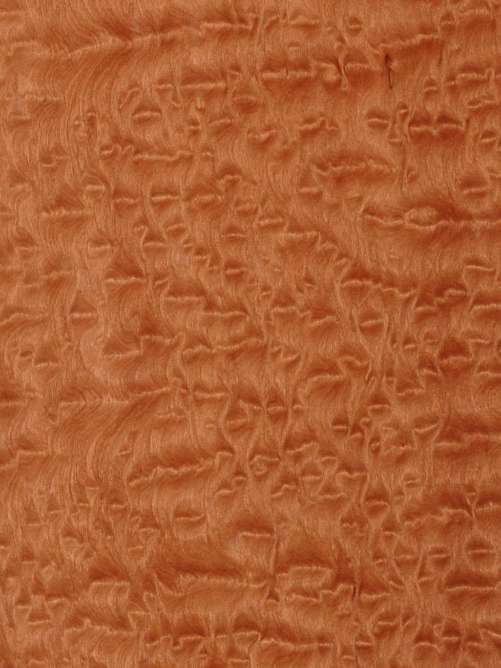 One of the largest trees in equatorial Africa, this tropical hardwood’s immense size ensures large leaves and volumes of veneer well suited for architectural use. Regarded for its shimmering luster that refracts light, this species ranges from pinkish brown to rich red in color with a fine, even texture, and a typically straight grain that may be decorated with a wide range of widely variable figures, including a highly prized Pommele. As with most veneers, almost every log is unique. Learn About Veneer Cut & Matching
One of the largest trees in equatorial Africa, this tropical hardwood’s immense size ensures large leaves and volumes of veneer well suited for architectural use. Regarded for its shimmering luster that refracts light, this species ranges from pinkish brown to rich red in color with a fine, even texture, and a typically straight grain that may be decorated with a wide range of widely variable figures, including a highly prized Pommele. As with most veneers, almost every log is unique. Learn About Veneer Cut & Matching -
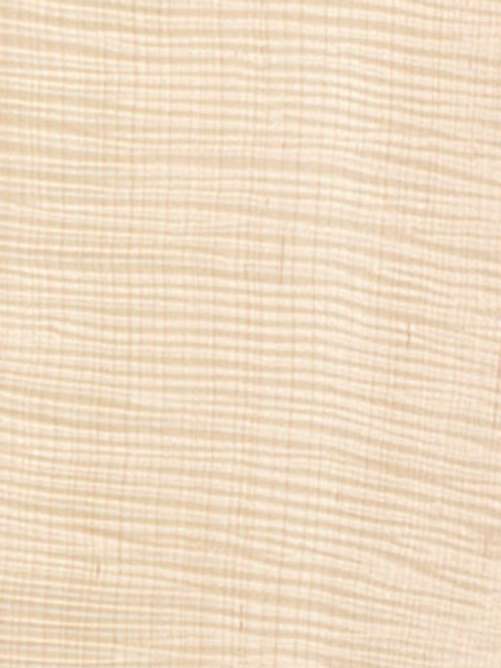 From the same tree that produces maple syrup, comes this beautiful veneer that ranges in color from snow white to warm yellow; has a close, fine luminous texture; and a lovely straight grain that may be interspersed with natural character marks. A wide range of gorgeous figures and wild grain distortions—from curly to bird’s eye to maple burl—are sought after for distinctive paneling and furniture. Flat cut maple displays the distinctive heart or cathedral pattern. Learn About Veneer Cut & Matching
From the same tree that produces maple syrup, comes this beautiful veneer that ranges in color from snow white to warm yellow; has a close, fine luminous texture; and a lovely straight grain that may be interspersed with natural character marks. A wide range of gorgeous figures and wild grain distortions—from curly to bird’s eye to maple burl—are sought after for distinctive paneling and furniture. Flat cut maple displays the distinctive heart or cathedral pattern. Learn About Veneer Cut & Matching -
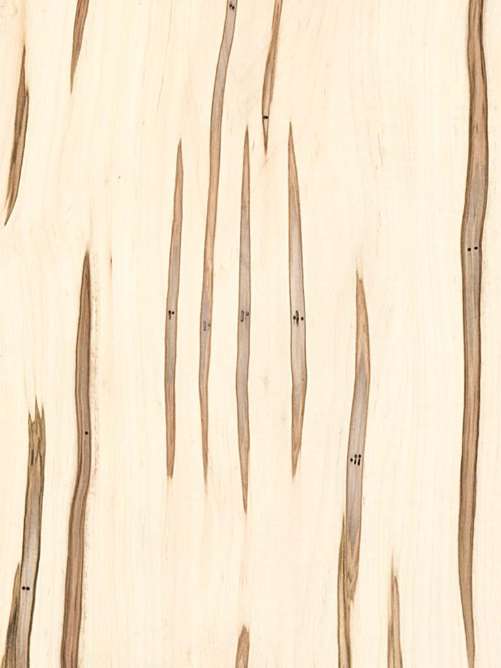 From the same tree that produces maple syrup, comes this beautiful veneer that ranges in color from snow white to warm yellow; has a close, fine luminous texture; and a lovely straight grain that may be interspersed with natural character marks. A wide range of gorgeous figures and wild grain distortions—from curly to bird’s eye to maple burl—are sought after for distinctive paneling and furniture. Flat cut maple displays the distinctive heart or cathedral pattern. Learn About Veneer Cut & Matching
From the same tree that produces maple syrup, comes this beautiful veneer that ranges in color from snow white to warm yellow; has a close, fine luminous texture; and a lovely straight grain that may be interspersed with natural character marks. A wide range of gorgeous figures and wild grain distortions—from curly to bird’s eye to maple burl—are sought after for distinctive paneling and furniture. Flat cut maple displays the distinctive heart or cathedral pattern. Learn About Veneer Cut & Matching -
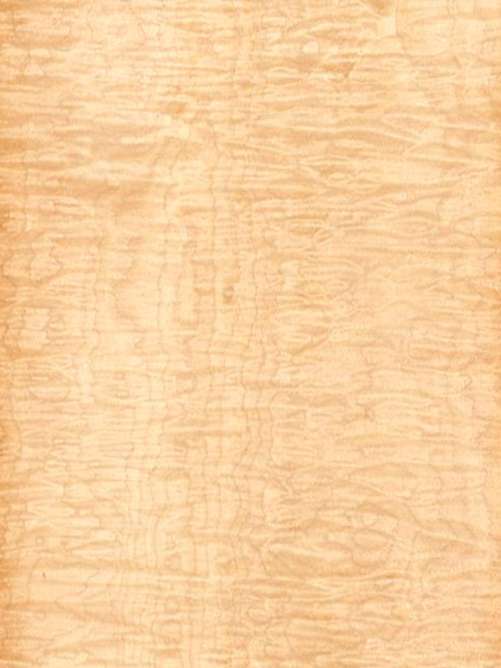 From the same tree that produces maple syrup, comes this beautiful veneer that ranges in color from snow white to warm yellow; has a close, fine luminous texture; and a lovely straight grain that may be interspersed with natural character marks. A wide range of gorgeous figures and wild grain distortions—from curly to bird’s eye to maple burl—are sought after for distinctive paneling and furniture. Flat cut maple displays the distinctive heart or cathedral pattern. Learn About Veneer Cut & Matching
From the same tree that produces maple syrup, comes this beautiful veneer that ranges in color from snow white to warm yellow; has a close, fine luminous texture; and a lovely straight grain that may be interspersed with natural character marks. A wide range of gorgeous figures and wild grain distortions—from curly to bird’s eye to maple burl—are sought after for distinctive paneling and furniture. Flat cut maple displays the distinctive heart or cathedral pattern. Learn About Veneer Cut & Matching -
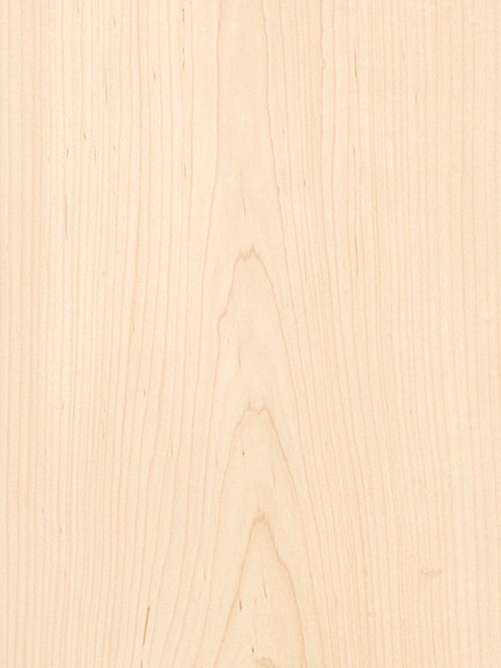 From the same tree that produces maple syrup, comes this beautiful veneer that ranges in color from snow white to warm yellow; has a close, fine luminous texture; and a lovely straight grain that may be interspersed with natural character marks. A wide range of gorgeous figures and wild grain distortions—from curly to bird’s eye to maple burl—are sought after for distinctive paneling and furniture. Flat cut maple displays the distinctive heart or cathedral pattern. Learn About Veneer Cut & Matching
From the same tree that produces maple syrup, comes this beautiful veneer that ranges in color from snow white to warm yellow; has a close, fine luminous texture; and a lovely straight grain that may be interspersed with natural character marks. A wide range of gorgeous figures and wild grain distortions—from curly to bird’s eye to maple burl—are sought after for distinctive paneling and furniture. Flat cut maple displays the distinctive heart or cathedral pattern. Learn About Veneer Cut & Matching -
 From the same tree that produces maple syrup, comes this beautiful veneer that ranges in color from snow white to warm yellow; has a close, fine luminous texture; and a lovely straight grain that may be interspersed with natural character marks. A wide range of gorgeous figures and wild grain distortions—from curly to bird’s eye to maple burl—are sought after for distinctive paneling and furniture. Flat cut maple displays the distinctive heart or cathedral pattern. Learn About Veneer Cut & Matching
From the same tree that produces maple syrup, comes this beautiful veneer that ranges in color from snow white to warm yellow; has a close, fine luminous texture; and a lovely straight grain that may be interspersed with natural character marks. A wide range of gorgeous figures and wild grain distortions—from curly to bird’s eye to maple burl—are sought after for distinctive paneling and furniture. Flat cut maple displays the distinctive heart or cathedral pattern. Learn About Veneer Cut & Matching -
 From the same tree that produces maple syrup, comes this beautiful veneer that ranges in color from snow white to warm yellow; has a close, fine luminous texture; and a lovely straight grain that may be interspersed with natural character marks. A wide range of gorgeous figures and wild grain distortions—from curly to bird’s eye to maple burl—are sought after for distinctive paneling and furniture. Flat cut maple displays the distinctive heart or cathedral pattern. Learn About Veneer Cut & Matching
From the same tree that produces maple syrup, comes this beautiful veneer that ranges in color from snow white to warm yellow; has a close, fine luminous texture; and a lovely straight grain that may be interspersed with natural character marks. A wide range of gorgeous figures and wild grain distortions—from curly to bird’s eye to maple burl—are sought after for distinctive paneling and furniture. Flat cut maple displays the distinctive heart or cathedral pattern. Learn About Veneer Cut & Matching -
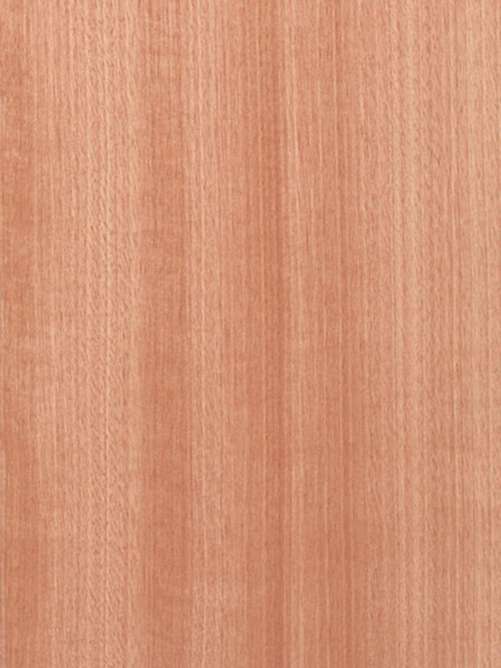 Also called African cherry, Makore shares the light pink to deep red coloring, dark growth lines, and small pores common to cherry. In architectural installations, it has the added benefit of availability in large sizes not found in American cherry. Cut on the quarter, Makore shows a contrasting stripe that may be plain or crossed with a variety of decorative figures. Flat cut, it bears the distinctive cathedral grain pattern. Learn About Veneer Cut & Matching
Also called African cherry, Makore shares the light pink to deep red coloring, dark growth lines, and small pores common to cherry. In architectural installations, it has the added benefit of availability in large sizes not found in American cherry. Cut on the quarter, Makore shows a contrasting stripe that may be plain or crossed with a variety of decorative figures. Flat cut, it bears the distinctive cathedral grain pattern. Learn About Veneer Cut & Matching -
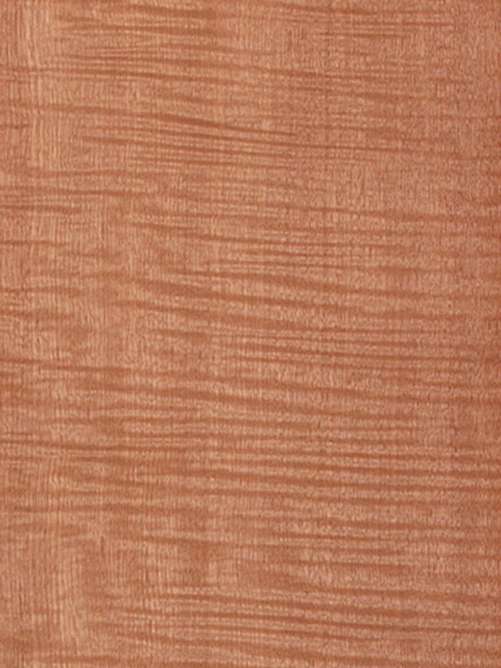 Also called African cherry, Makore shares the light pink to deep red coloring, dark growth lines, and small pores common to cherry. In architectural installations, it has the added benefit of availability in large sizes not found in American cherry. Cut on the quarter, Makore shows a contrasting stripe that may be plain or crossed with a variety of decorative figures. Flat cut, it bears the distinctive cathedral grain pattern. Learn About Veneer Cut & Matching
Also called African cherry, Makore shares the light pink to deep red coloring, dark growth lines, and small pores common to cherry. In architectural installations, it has the added benefit of availability in large sizes not found in American cherry. Cut on the quarter, Makore shows a contrasting stripe that may be plain or crossed with a variety of decorative figures. Flat cut, it bears the distinctive cathedral grain pattern. Learn About Veneer Cut & Matching -
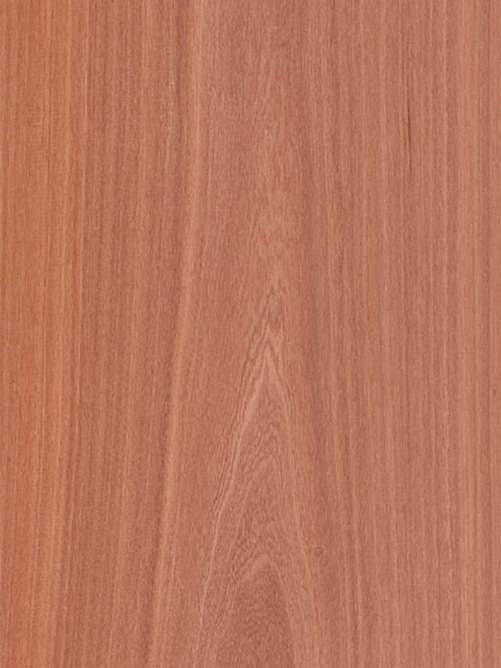 Also called African cherry, Makore shares the light pink to deep red coloring, dark growth lines, and small pores common to cherry. In architectural installations, it has the added benefit of availability in large sizes not found in American cherry. Cut on the quarter, Makore shows a contrasting stripe that may be plain or crossed with a variety of decorative figures. Flat cut, it bears the distinctive cathedral grain pattern. Learn About Veneer Cut & Matching
Also called African cherry, Makore shares the light pink to deep red coloring, dark growth lines, and small pores common to cherry. In architectural installations, it has the added benefit of availability in large sizes not found in American cherry. Cut on the quarter, Makore shows a contrasting stripe that may be plain or crossed with a variety of decorative figures. Flat cut, it bears the distinctive cathedral grain pattern. Learn About Veneer Cut & Matching -
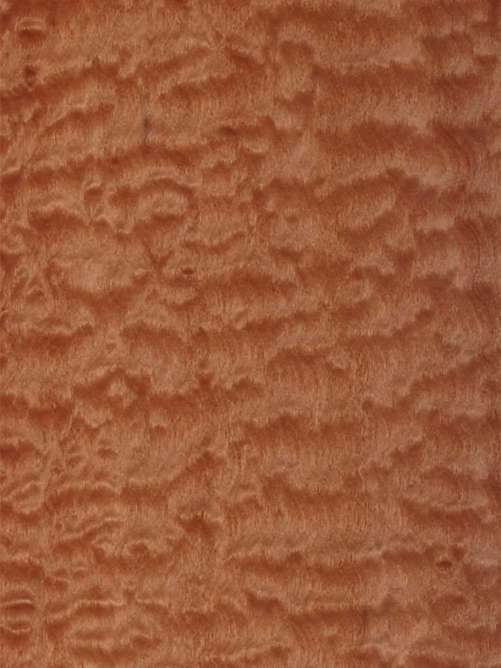 Also called African cherry, Makore shares the light pink to deep red coloring, dark growth lines, and small pores common to cherry. In architectural installations, it has the added benefit of availability in large sizes not found in American cherry. Cut on the quarter, Makore shows a contrasting stripe that may be plain or crossed with a variety of decorative figures. Flat cut, it bears the distinctive cathedral grain pattern. Learn About Veneer Cut & Matching
Also called African cherry, Makore shares the light pink to deep red coloring, dark growth lines, and small pores common to cherry. In architectural installations, it has the added benefit of availability in large sizes not found in American cherry. Cut on the quarter, Makore shows a contrasting stripe that may be plain or crossed with a variety of decorative figures. Flat cut, it bears the distinctive cathedral grain pattern. Learn About Veneer Cut & Matching -
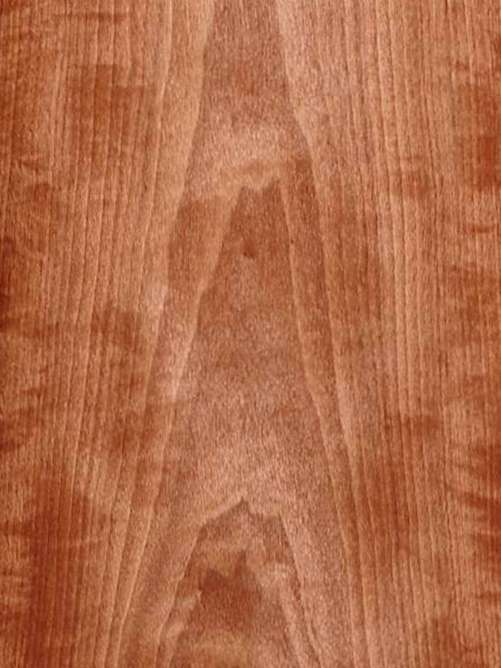 Also called African cherry, Makore shares the light pink to deep red coloring, dark growth lines, and small pores common to cherry. In architectural installations, it has the added benefit of availability in large sizes not found in American cherry. Cut on the quarter, Makore shows a contrasting stripe that may be plain or crossed with a variety of decorative figures. Flat cut, it bears the distinctive cathedral grain pattern. Learn About Veneer Cut & Matching
Also called African cherry, Makore shares the light pink to deep red coloring, dark growth lines, and small pores common to cherry. In architectural installations, it has the added benefit of availability in large sizes not found in American cherry. Cut on the quarter, Makore shows a contrasting stripe that may be plain or crossed with a variety of decorative figures. Flat cut, it bears the distinctive cathedral grain pattern. Learn About Veneer Cut & Matching

